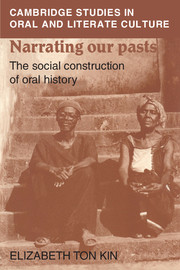Book contents
- Frontmatter
- Contents
- List of illustrations
- Acknowledgments
- Note on orthography
- Introduction
- 1 Jlao: an introductory case study
- 2 The teller of the tale: authors and their authorisations
- 3 Structuring an account: the work of genre
- 4 Temporality: narrators and their times
- 5 Subjective or objective? Debates on the nature of oral history
- 6 Memory makes us, we make memory
- 7 Truthfulness, history and identity
- Notes
- Bibliography
- General index
- Index of names
- Plate section
4 - Temporality: narrators and their times
Published online by Cambridge University Press: 05 June 2012
- Frontmatter
- Contents
- List of illustrations
- Acknowledgments
- Note on orthography
- Introduction
- 1 Jlao: an introductory case study
- 2 The teller of the tale: authors and their authorisations
- 3 Structuring an account: the work of genre
- 4 Temporality: narrators and their times
- 5 Subjective or objective? Debates on the nature of oral history
- 6 Memory makes us, we make memory
- 7 Truthfulness, history and identity
- Notes
- Bibliography
- General index
- Index of names
- Plate section
Summary
Telling in time
There is a truly enormous literature on time, which continues to engage the attention of philosophers, scientists, linguists, novelists, anthropologists … – and all of these approaches may be relevant to the analysis of a historical account. In any discussion of temporality looms the weight of the possible approaches not discussed, of massed reference and theoretical complexity, including the complexity of ‘time’ as one English label for many characteristics which peoples all over the world and in different past times have understood very differently.
In this chapter, then, the illustration is actually very limited even when the detail seems dense, and discussion moves from the consequences of temporal contingency to the constraints of verbal representation. Time as ‘contingency’, because every narration is prompted by the intersection in real time of a narrator and listener(s); and the narration itself occupies a phase of irreversible time. The narrators and listeners connected by this contingency are thereby caught at a certain stage of their lives; they have also been formed inescapably by their own personal pasts to date. These factors influence the narration whether or not it is autobiographical; tellers are constructing retrospective accounts for audiences with different time scales, and they may adjust their own narrations to the memories and understanding of their listeners.
- Type
- Chapter
- Information
- Narrating our PastsThe Social Construction of Oral History, pp. 66 - 82Publisher: Cambridge University PressPrint publication year: 1992
- 1
- Cited by



